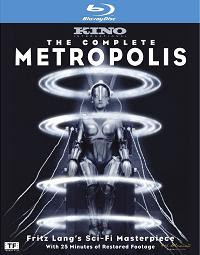Read the first part of this article by going to Fritz Lang's Metropolis Review, Part I.

Metropolis has not only introduced characters. In addition to Rotwang's artificial hand there are numerous details that have influenced the movies to come. The city of Metropolis with its skyscrapers and highways in the air or its underground section has provided innovative images grown into a standard for futuristic cities. The laboratory of the evil genius Rotwang has been re-created again and again. The humanoid robots have become an organic part of sci-fi cinema. Changing faces is another familiar trick. Introducing places of pleasure like brothels or bars in science-fiction films could also be attributed to Metropolis. And there are even videophones.
Metropolis offers tons of sparkling originality: clock-like behaving workers, some of them operating machines similar to clocks (homage could be seen in the video of Queen's song Radio Ga-Ga); a clock with 10 hour scale in order to count down the time for a working shift; imaginative Pleasure Gardens; a Babel Tower reference; doors closing and opening on their own; a passionate robot dance; light and shadow games; powerful mass scenes. There are plenty of visual effects starting from the look of upper Metropolis with its skyscrapers and highways through the light rings and electrical arcs in Rotwang's lab to the collapsing underground plant.
As a part of German Expressionism, Metropolis manifests most of its characteristics. The performances are over the top, the set designs are stylized, there are plenty of symbols, crowded environments, monumentalism, angular buildings, dark shadows, etc. But Metropolis has influenced thousands of films not only because of its expressionist style but also due to ideas far ahead of their time. You can see mad scientists, humanoid robots, artificial hands, Metropolis-like cities and other of its creations in movies like Blade Runner, Star Wars trilogies, Dr. Strangelove or: How I Learned to Stop Worrying and Love the Bomb, Dark City, The Fifth Element, Batman series and so on. And after Metropolis, science has been used quite often in cinema as a cause for an eventual end of humanity.
Metropolis offers also a portion of social elements by depicting classes separation and their mutual unawareness. It shows that a constantly oppressed working class would rebel against its rulers sooner or later. Yet, a leader and good organization are needed in order complete chaos and self-destruction to be avoided. Fritz Lang has created a viable picture of contemporary and future societies divided in classes ignorant of their own needs and interests as well as miscommunicating between each other. But the movie also shows that a wrong leader could be disastrous possibly hinting at the rise of Nazis and their Führer in Germany.
The otherwise silent black-and-white original Metropolis has been "enhanced" through the years with color tinting and modern musical score. Unlike the similar altering of Nosferatu, the musical score here is not such an annoying addition and fits well into the film. Big parts of the genuine picture has been missing for years and occasionally new pieces have been discovered but even now there is not a fully reconstructed original version.
As strange as it may seem Metropolis has aged quite well. The movie magnetically attracts the spectator from its very beginning and contrary to many other films of that era it is not boring or alienated. Metropolis' charm roots partially in the great talent and efforts involved in its making and on the other hand its fascination is coming from the fact that the audience of today is discovering in astonishment where it all has started for the science-fiction genre in cinema. It is a pleasure to find out so many resemblances with future movies and if you haven't gone through this gratifying experience yet, do not postpone it for too long.
Go through our maze of reviews to discover more movie reviews and articles.



0 comments:
Post a Comment